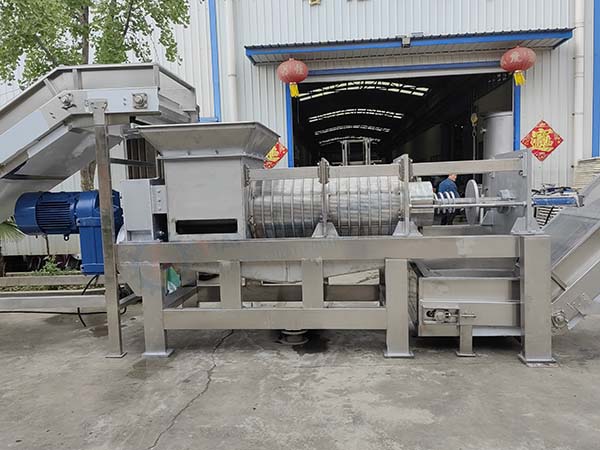Organic waste dewatering machine
Contents |
[edit] Introduction
In the realm of waste management innovation, the fruit and vegetable waste dewatering machine emerges as a transformative solution, effectively reducing waste volume and environmental impact. This cutting-edge equipment employs a straightforward yet highly efficient mechanical squeezing mechanism, swiftly eliminating moisture from fruit and vegetable waste, positioning it as a pivotal tool for modern waste processing.
[edit] Working Principle
At its core, the screw dewatering machine relies on the mechanical compression of waste material to expedite the removal of moisture. This process not only significantly decreases the weight of the waste but also reduces its volume, marking a substantial leap forward in waste management efficiency.
[edit] Processing Workflow
The operational workflow of the machine encompasses several key steps, including feeding, dehydration, and residue discharge. As fruit and vegetable waste is introduced into the machine, an internal screw squeezing mechanism efficiently removes moisture. The residue discharge outlet then expels the remaining solid waste, completing a comprehensive and streamlined processing cycle.
[edit] Advantages
1. High Efficiency and Energy Conservation
The adoption of mechanical compression accelerates the dehydration process, achieving remarkable efficiency within a short time frame. Simultaneously, the liquid solid separation equipment minimises energy consumption, aligning with modern energy-efficient practices and contributing to a more sustainable operational model.
2. Volume Reduction
By effectively dehydrating fruit and vegetable waste, the machine significantly reduces the volume of waste, making it more manageable for subsequent processing and transportation. This reduction in volume not only improves logistical aspects but also contributes to a lighter environmental footprint.
3. Environmental Protection
Dehydrated fruit and vegetable waste are more easily managed and prone to decomposition, reducing the risk of soil and water pollution. This aspect of the machine's functionality is crucial for creating a cleaner and healthier ecological environment, aligning with global environmental preservation goals.
4. Recyclability
The reduced moisture content in dehydrated waste enhances organic material concentration, providing an optimal foundation for the production of organic fertilrers. This process fosters a closed-loop system, emphasising the recycling and reuse of resources, thereby contributing to a more circular and sustainable economy.
[edit] Operating Guidelines
1. Adherence to Standard Operating Procedures:
Operators must be well-versed in the correct usage of the equipment to ensure its smooth operation and the effective processing of fruit and vegetable waste. Strict adherence to standard operating procedures is fundamental to maximising the machine's potential.
2. Regular Maintenance:
Routine inspections and maintenance routines are essential to uphold the proper functioning of the dewatering machine. This proactive approach not only ensures the longevity of the equipment but also contributes to sustained operational efficiency.
3. Safety Precautions:
In the course of operation, strict adherence to safety measures is imperative. This ensures the well-being of operators, preventing injuries, and guarantees the secure and reliable operation of the equipment.
[edit] Conclusion
In conclusion, the fruit and vegetable waste dewatering machine represents a significant leap forward in waste management technology, offering an efficient, environmentally friendly, and sustainable solution for processing fruit and vegetable waste. Its innovative design, multifaceted advantages, and commitment to operational excellence make it an invaluable asset in the global effort towards responsible waste management and resource conservation.
- = Related articles on Designing Buildings =
- Anaerobic digestion.
- Biomass.
- Biogas.
- Circular economy.
- Composting.
- Disposal.
- Environmental impact assessment EIA.
- Reduce, reuse, recycle.
- Recycling explained
- Site Waste Management Plans – A Necessary Burden.
- Types of fuel.
- Waste and Resources Action Programme WRAP.
- Waste hierarchy.
- Waste management plan for England.
- Wishcycling.
- Working with lighting maintenance contractors.
- Anaerobic digestion.
- Biomass.
- Biogas.
- Natural resource.
Featured articles and news
The first line of defence against rain, wind and snow.
Building Safety recap January, 2026
What we missed at the end of last year, and at the start of this...
National Apprenticeship Week 2026, 9-15 Feb
Shining a light on the positive impacts for businesses, their apprentices and the wider economy alike.
Applications and benefits of acoustic flooring
From commercial to retail.
From solid to sprung and ribbed to raised.
Strengthening industry collaboration in Hong Kong
Hong Kong Institute of Construction and The Chartered Institute of Building sign Memorandum of Understanding.
A detailed description from the experts at Cornish Lime.
IHBC planning for growth with corporate plan development
Grow with the Institute by volunteering and CP25 consultation.
Connecting ambition and action for designers and specifiers.
Electrical skills gap deepens as apprenticeship starts fall despite surging demand says ECA.
Built environment bodies deepen joint action on EDI
B.E.Inclusive initiative agree next phase of joint equity, diversity and inclusion (EDI) action plan.
Recognising culture as key to sustainable economic growth
Creative UK Provocation paper: Culture as Growth Infrastructure.
Futurebuild and UK Construction Week London Unite
Creating the UK’s Built Environment Super Event and over 25 other key partnerships.
Welsh and Scottish 2026 elections
Manifestos for the built environment for upcoming same May day elections.
Advancing BIM education with a competency framework
“We don’t need people who can just draw in 3D. We need people who can think in data.”





















